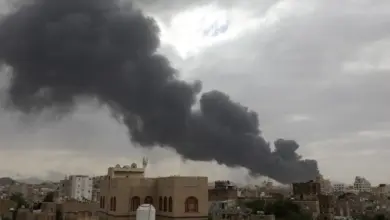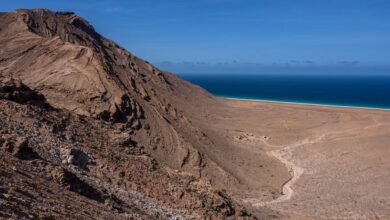Sanaa — The first armoured division of the Yemeni military spread out to protect the various entries of Sanaa University, the site of the 21 March sit-in. The demonstrators erupted with joy at the site of the military presence. Droves of those in attendance danced, cheered and carried recently-defected army personnel through the crowd. In a country that claims an extremely high per capita rate of weaponry possession, no guns were in sight. Instead, many carried flowers and distributed roses to the soldiers to honor their decision.
“I like you better with the flower than the gun!” shouted a demonstrator.
The defection of a key Yemeni military figure earlier this week has triggered higher protest turnouts in the capital and, in its wake, continues to permit dissenters to speak critically of the government with a reduced degree of fear.
Along with Major General Ali Mohsen, a dozen military commanders in past days and 2400 officers and soldiers have declared their solidarity with demonstrators demanding the ouster of President Ali Abdullah Saleh.
“No snipers will attack the protesters again, as we have the army to protect us now,” said demonstrator Ahmed Salem.
Formerly, central security forces affiliated with President Ali Abdullah Saleh kept watch over the demonstrations. The security branch is accused of attacking protesters several times in the past month, including the notoriously fatal incident on 17 March dubbed “Bloody Friday.” Gunman on rooftops gunned down 52 protesters. Some of the assailants were apprehended by protesters and transferred to state prosecution.
“It's safer now to join the protest,” said female demonstrator Amira al-Arasi. “He [Mohsen] is a big support to the revolution. Now we feel safer to join the protest in the sense that Saleh will be busy fighting Mohsen and won’t pay attention to us.”
President Saleh has threatened the defections will engender civil war in the country fragmented by a persistent rebellion in the north, a secessionist movement in the south, and a strong Al-Qaeda presence in the southwest. Saleh on Tuesday addressed the Yemeni Defense Council and urged military unity and loyalty.
“To those who want to climb to authority by coup, don’t think things will be stable. The country won’t be stable,” said Saleh, who claims a three-decade-long tenure in office, in the speech broadcast live on television. “It will turn to a civil war, a bloody war.”
Despite Saleh’s plea to the defected military men to rejoin him, Major General Ali Mohsen in recent days has defied the president’s calls, confirming support for, and protection of, the protesters. Mohsen also denied claims he is eying a military power grab.
“The time of military coups has ended. Now the only way is by demanding rights by modern public ways,” said Mohsen. “The armed forces pledge to defend you, the protesters and the country, and we will give our souls to protect the country’s gains and to protect you and we confirm your demands.”
Political science professor at Sanaa University Abdullah al-Faqeeh argues Mohsen’s defection ensures Saleh no longer has the capacity to pursue robust military action.
“Mohsen’s solidarity ended the battle for the president,” said al-Faqeeh. “Nothing is left for the president but the special forces and counter-terrorism forces, which is trained by the US, so no one can use them against the people.”
Al-Faqeeh claims, in the event Saleh now uses force against his people, the international community will hold the United States responsible.
“Saleh doesn’t have the power that enables him to start a civil war,” al-Faqeeh said. “Ninety percent of the military is under Mohsen command. Saleh is Qadhafi by talk and not action.”
Merely 200 members of the armed forces declared their solidarity with the protesters prior to Mohsen’s defection. In the wake of his announcement, the vast majority of defectors followed. The number continues to grow.
The defectors are aware their decision will encourage punishment by the state.
“Everybody is scared for his salary and life. That’s why they hesitated to join before now,” said al-Khodari. “They warned us against joining the protest when they knew about the coalition, and forbid any soldier to attend the protest for any reason. They said that they will be spying on us.”
Al-Khodari also said the opposition coalition was told one of the soldiers that joined the protest a week ago is now on the state terror list.
“The honorable people are at home, suspended from their jobs,” said al-Khodari, adding the Saleh government has both threatened soldiers against defecting and offered incentives. The government, according to Saleh, pledged to increased monthly wages from YR 25,000 (US$116) to YR 30,000 (US$139).
President Saleh declared a state of emergency for 30 days on 18 March — later approved by parliament — but no curfew has yet to be declared. The unrest has canceled many investment projects in the country. The majority of foreign embassies in Sanaa instructed citizens to leave the country. And six journalists were deported from the country in the past week while Al-Jazeera offices were closed and their license confiscated.
After negotiations between protesters, academics and opposition parties, demonstrations scheduled for 25 March will be dubbed “Friday of departure” instead of “Friday of crawl.”
“The president lost his legitimacy on Friday [March 17],” said opposition coalition spokesperson Mohamed Saleh. “The parliament also lost its legitimacy two years ago. This regime never respects any laws or the constitution.”



